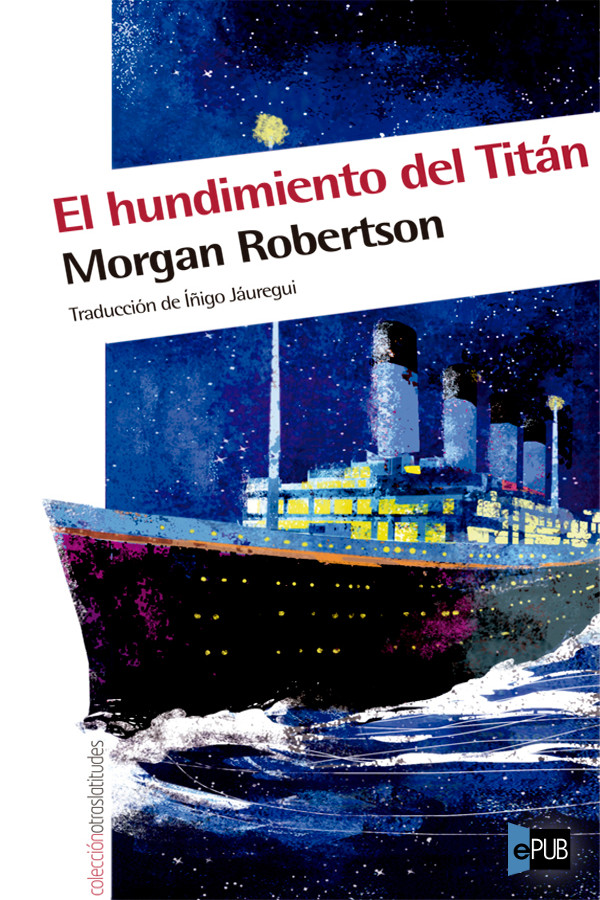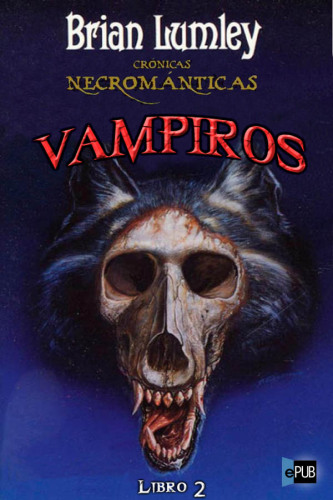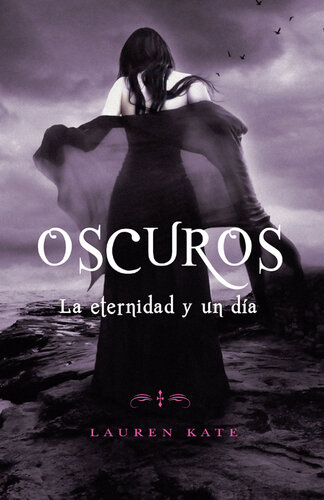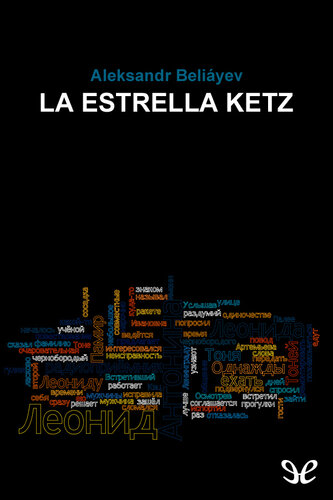oleebook.com
El hundimiento del Titán de Robertson, Morgan
de Robertson, Morgan - Género: Ficcion
Sinopsis
El Titanic se hundi? hace 100 a?os. Publicamos ahora uno de esos curiosos libros que han atra?do a muchos lectores a lo largo del siglo XX, ya que fue escrito catorce a?os antes del famoso naufragio y cuenta una historia pr?cticamente id?ntica: un trasatl?ntico llamado Tit?n se hunde en las aguas del oc?ano Atl?ntico al chocar con un iceberg. El Titanic se parece de manera desconcertante al Tit?n que Robertson cre? en la ficci?n: coinciden incluso en peso longitud y capacidad de pasajeros. Tambi?n en que el Tit?n era un buque con exceso de lujos que llevaba una cantidad insuficiente de botes salvavidas. Algunos creen que se trata de una mera casualidad y otros que el autor escribi? un libro premonitorio de lo que suceder?a a?os despu?s, lo que dota al texto de un claro inter?s hist?rico. Morgan Robertson fue un visionario, como Jules Verne, a quien sin duda nos recordar? estil?sticamente esta novela.? Es una historia conocida: el barco m?s grande jam?s construido, apodado ?el insumergible? por sus propietarios brit?nicos y la presa, choca con un iceberg. Debido a la falta de botes salvavidas, la mayor parte de los pasajeros perece en el Atl?ntico Norte. Una historia id?ntica a la del Tit?n, salvo que este es un trasatl?ntico de ficci?n y que su creador public? el libro catorce a?os antes del hundimientos del RMS Titanic.
Libros Recomendados - Relacionados
Reseñas Varias sobre este libro
Updated 23/06/2023: Bumping this review again because people don't learn a thing from either fact or fiction and keep tempting fate by both naming a submersible "Titan" and skipping on safety & precautionary measures.
__________________________
I am shocked at how similar this 1898 novella is to the sinking of the Titanic! Either the author inherited Jules Verne's crystal ball or this is the biggest coincidence ever. I'll have to do a bit of research on what proof there is for the publication date being fourteen years prior to the Titanic's disaster, because the coincidences, from the name of the ships to the lack of enough lifeboats to ramming a ship before colliding into an iceberg are just too much to digest without looking further into all this.
As for the story, it was nice. I think it'd make for a good Titanic II type of film, especially as it has what the mostly romantic-focused plot of the original film with Winslet and DiCaprio lacked. There's even an insurance fraud side plot that's sure to refloat (har!) the conspiracy theories about that being the case with the Titanic. There's survival drama, human pettiness, on ship rivalries and backstabbing, squabbling over who's to blame for the sinking and who's to pay for it, sailor heroics, and even a wee bit of romance, all of which more than compensate for the writing itself, which isn't so good.contemporary-fiction have-reviewed143 s2 comments Duane Parker828 429
This is a work of fiction. I say that because it has an eerie similarity to the story of the sinking of the Titanic in 1912. But this story was written in 1898, 14 years before the real disaster. Similarities the name, Titan. 3,000 people on board, not enough lifeboats, traveling to fast for the conditions, striking an iceberg. It's almost Robertson took a peek into the future and gave them a warning. 2017-book-challenge american-classics audio-books ...more76 s Matthew1,221 9,447
WARNING: Here there be unmarked spoilers!
I thought this would be really interesting and mysteriously spooky as a predictor of the Titanic disaster that occurred years after the publication of this book. However, this is just a so-so mystery/courtroom drama about redemption of one of the main characters where the sinking of the ship is an afterthought to the main storyline. If I wasnt going in with bigger expectations for the shipwreck being the key event of the story, I may not have minded its barely being included.
Note: This novella was published as Futility and not changed to The Wreck of the Titan until right after the Titanic sunk. Talk about cashing in on a tragedy.
Learning about the pitiful life of John Rowland and watching him dig his way out of the hole of his tragic past is interesting and worth giving a shot. But, SERIOUSLY, the ship and its sinking are very minor characters/events so PLEASE do not go in expecting anything the last two hours of the movie Titanic with action and drama as the ship slowly sinks into icy waters. If you go in expecting any more than a couple of pages related to the ships sinking, I guarantee disappointment.This entire review has been hidden because of spoilers.Show full review2021 audible audio ...more57 s Gavin Hetherington682 6,633
Check out my video where I talk about the eerie comparisons to the Titanic sinking that happened 14 years AFTER this book was originally published: https://youtu.be/-ipPQ24h0XQ2021-reads43 s Jim C1,600 24
This is a short story about an unsinkable ship that hits an iceberg and sinks. You might have some knowledge about something that happening in real life. That is how this short story is trying to sell itself. It was written years before the tragedy of the Titanic and how this fictional work has some eerie similarities to the tragedy.
I would say this short story is told in two parts. The first part is the incident of the ship hitting the iceberg. I will admit there are some similarities to the actual event. I don't know if I would say they are strong enough that they were predictions of something to come. I was really interested in the first half and discovering the similarities. I do find that stuff kind of eerie. Unfortunately the "eerie" factor never truly materialized in this story. That being said I was giving this a four star rating up to this point. The second half turns out to be a courtroom drama that is over so quickly that if you blink you might miss it. This missed the mark for me and why I had to lower my rating.
This was an interesting read and I am glad that I read it. I d it but I think I was expecting something else. Something where fictional events mimicked actual events events and freak me out. This book never really achieved that even with its loose connections to the actual tragedy. 38 s Carien1,273 30
Having been interested in the Titanic for as long as I can remember I had often heard of this story and the uncanny similarities between the Titan and the Titanic. It was only recently that I actually got hold of this book and read it though.
And let me say that I think it's almost a shame that this story will forever be linked to the sinking of the Titanic instead of being known for it's own merits. Because this is a very entertaining story.
So there are a few similarities between the Titan and the Titanic: there are many more differences. Futility is a suspenseful story with dark conspiracies, lost love, survival and it has a man fighting a polar bear!
I had expected to be awed by the similarities, instead I was grabbed by the adventurous tale of a man down on his luck who then has to fight for his life against impossible odds. I found myself cheering the hero on and hoping that his struggles wouldn't turn out to be futile as the title of this book suggests.
The writing is a bit dated of course and there are some serious info dumps at the start, but all in all it's an easy, pleasant read.
I will most certainly reread this unexpected little gem in the future and can advice anyone who loves a good suspenseful story to read it as well.26 s Julie1,913 563
For years I have heard about this book. Many say this fictional tale about the sinking of a great ship, the Titan, mirrors the wreck of the Titanic in 1912. This fact is astounding because the book was written in 1898, 14 years before the Titanic sank after striking an iceberg. Robertson said the similarities were not because of clairvoyance on his part, but due to his knowledge of sailing and ship building trends.
The book was re-released in 1912 following the Titanic sinking, causing some to say Robertson was cashing in on the disaster. There were a few minor changes made in the 1912 re-print. For example, the weight of the Titan was increased in the 1912 version to better match the size of the Titanic. But, large changes in plot were not made. The coincidences between the fictionalized story of the Titan and the real life sinking of the Titanic are eerie. Both ships are British and quite opulent. Both sank in April in the Northern Atlantic after striking an iceberg on the starboard side. Both sank near midnight and had too few lifeboats. One notable difference: The fictional Titan only had 13 survivors, whereas 705 passengers aboard the Titanic survived the accident.
Despite being intrigued by the rumors surrounding this book for years, I never took time to actually read it.
Until now. And I'm so glad I did!
Of course, the language and writing style is dated, but Futility is still an enjoyable read. The book is short and a quick, exciting read. Despite the many similarities to the Titanic disaster, I think this is a wonderful adventure story that should be judged on its own merits.
The basics: John Rowland is a sailor down on his luck. He was demoted from an officer's position due to drinking and is sailing on the Titan as a common sailor. The ship is sailing from America to Ireland. On the first night at sea, the ship strikes another vessel, cutting it in two. Taking little to no damage herself, the Titan continues on its way, not stopping to attempt to save anyone from the sinking vessel. Officers on the Titan immediately start damage control.....looking for anyone who might have seen the accident and bribing (or threatening) them into silence. Rowland refuses to be bribed and says he will report the actions of the officers as soon as they reach port. The officers plan to discredit him before they reach port given his history of drunkenness. However, before they can attempt more than drugging the man into a stupor, the ship violently strikes an iceberg, listing and sinking almost immediately. Only 13 people make it off the ship alive. Rowland is stranded on the iceberg with a little girl, the daughter of a former love interest of his who happened to be a passenger on the Titan with her husband. Rowland braves a polar bear attack and extreme cold while stranded at sea -- and wily attorneys, stock holders, insurance companies, and even reporters after they are rescued. What an exciting story! The antiquated, larger than life, adventure story style Robertson uses to weave his tale reminds me a lot of the Edgar Rice Burroughs Tarzan books. While I was doing some research before writing this review, I found out that Burroughs was actually inspired by Robertson's writings! :)
So, although the story is similar to the Titanic disaster, most of it is completely different. It is still eerie that the ships are so a. But as Robertson stated himself, it isn't because of anything supernatural but just a coincidence stemming from his knowledge of shipping, trends in shipbuilding and sailing. Read this story for the joy of adventure and the sea, not from a need to relate it to the Titanic disaster.
As in most larger-than-life old school adventure tales, this story is not realistic. I don't believe anyone on a ship would be oblivious to the fact it collided with another vessel, cutting it in half. The story relates that most of the passengers were asleep and not awakened. Not possible. The iceberg that Rowland and the little girl are stranded on seems to be huge....much larger than possible, really. And I doubt a polar bear would be on an iceberg 900 miles off the American coast, but I could be wrong. I'm not a polar bear or iceberg expert. In this instance, I just chose to suspend reality and go with the flow. It's a very testosterone-y, macho, man-against-the-elements-and-evil-assholes kind of story.....and if Robertson wanted a polar bear to be on a huge freakin' iceberg in the middle of the North Atlantic, then so be it. I'm all for it! Sometimes you just have to enjoy the adventure and forget about how things really work. :)
As it is in the public domain after nearly 120 years, the full text of the novel (and also the book The Pirates, also by Robertson) is available for free online here: https://archive.org/details/wrecktita... Look for the Download Options heading and pick what format you'd to use. I loaded a copy onto my Kindle App on my Iphone and PC quite easily. There are many websites that list the similarities between the two ships, information on Robertson, and about the construction and sinking of the Titanic. I found a nice comparison of the book to the Titanic sinking here: http://www.historyonthenet.com/the-ti... . There are also some nice links to Titanic facts at the bottom of that page.
Robertson wrote more than 100 books and short stories before his death in 1915. Unfortunately, most people are only familiar with Futility. After reading this one story, I'm going to find more by this author and enjoy some more adventures! The Grain Ship and Where Angels Fear To Tread & Other Stories Of The Sea are available for free through Project Gutenberg.read-kindle-201713 s iris???.*???114
Poor Rowland really suffered.10 s Anjalique103 9
In this review I will discuss two things: 1) The story of the Titan as it relates to the wreck of the Titanic and 2) This 1994 reprint, and the author's actual writing skill, on their own merits.
1) Yes, this book was added to my "Titanic" bookshelf collection because of the similarities between the fictional and actual wrecks. I've done a bit of reading online about the original 1898 edition, and from what I gather, the following changes were made to most subsequent printings (beginning in the year of the "Titanic" disaster, 1912) to create more similarities between ships: The gross tonnage, the amount of water displacement, horsepower, the use of the word 'unsinkable, and the changing of the title "Futility" to "Futility, or The Wreck of the Titan." Also, subsequent printings are said to have given the story a happier "Hollywood"-type ending.
2) I have a 1994 edition that was printed by Buccaneer. I was disappointed to discover that "Futility" was only one short story amongst four short stories in this volume, the others being "The Pirates"/"Beyond the Spectrum"/"In the Valley of the Shadow."
"Futility": Despite its short length, I enjoyed this story and thought the writing was well-done (if the actual events a bit fantastical). Being an atheist myself, I was pleasantly surprised to read large sections of 'flow of consciousness' from the protagonist, who also identifies as atheist. His musings were intelligent and interesting, and he addressed the fact that even an atheist may encounter such desperate circumstances that it would be tempting to turn to "God" for help or deliverance.
If I had read only this story, and without the meddling alterations (which I had originally thought to have been made by the author, but have come to believe were the responsibility of zealous editors), I would have given it four stars.
"The Pirates": Because "Futility" was so brief, I kept expecting this story to end much sooner than it actually did. For that fact, I felt that it dragged on and on. And once again, the author has a penchant for almost ridiculous, fantastical coincidences.
"Beyond the Spectrum": Actually a very interesting concept for a novel, but because it was so undeveloped, I didn't find it particularly enjoyable.
"In the Valley of the Shadow": Not only undeveloped, but laugh-out-loud melodramatic. Reads an extremely rough draft of what ought to have been a 300-page novel, but only took me about fifteen minutes to read.
As I stated above, I would have given "Futility" itself four stars, but each subsequent novella following was worse and worse, until I came to the final decision of only two stars for the entire volume.8 s Kübra 1,860 361
Tanr?'n?n bile bat?ramayaca?? gemi slogan?yla yola ç?kan RMS Titanic 15 Nisan 1912'de, Kuzey Atlantik'te, gemi saatiyle 23.29'da buz da??na çarparak batmas?na kadar giden facian?n ilk ad?m? at?ld?.
Kay?plar?n hepsi ihmalkârl?k -bknz: gemiye yerle?tirilmi? filika say?s?- nedeniyle verildi?i için komplo severlerin eline bol malzeme veren bir olayd?r. Evet, ben de onlardan biriyim o yüzden bol bol bunlar? okudum.
Kitap ise bu olaylardan 14 y?l önce yaz?lm?? olup hayret verici benzerliklere yer verir. Elbette ba?tan a?a??ya ayn? de?il ancak benzedi?i yerleri de insan? tuhaf bir ?ekilde heyecanland?r?yor.
Robertson'?n kitaptaki gemisine "batmaz" demesi, geminin ad?n?n Titan olu?u ve bat?? nedeni, filika eksikli?i gibi noktalar vard?. Onun d???nda ho? bir kitapt? ama benim akl?m hâlâ ve hâlâ o teorilerde. :-D
Hele hele yazar?n Titanik'in bat???ndan iki y?l sonra ölmü? olmas? ve hiçbir röportaj?-konu?mas? olmad??? için akl?m? kurcal?yor. Çünkü birkaç yerde yazar?n ölüm nedeni olarak zehirlenme ihtimaline de?iniliyor.
Bir de yanl?? anlamad?ysam kitap 1997'de halka aç?lm?? ve benim buldu?um orijinal bask? tarihinden sonra en eskisi 1998 y?l?na ait. Yani yasakl? gibi bir ?eymi? kitap.
Neyse, bir gün tüm sorular?n cevab? ortaya ç?kar diye umuyorum.
Bunun üzerine de bir Titanic izlerim ben. ;-)1-english 2-fiction 3-1-roman7 s Alexandria Brim41 12
It's the story of the grandest ocean liner to sail the Atlantic. She sails fast through the cold water on her maiden voyage. On a clear night, she ends up hitting an iceberg and sinking. Only a few people make it to the lifeboats and there is a great loss of life.
Sound familiar? The story was published in 1898, fourteen years before the Titanic sailed (and sank). After the Titanic disaster, this story was added to all those "spooky coincidences" list. But when you read the story, it's not an exact account. In fact, the story more resembles the Poseidon Adventure. This is really John Rowland's story.
Who is John Rowland? He is a naval officer who has let his vices get the better of him to the point he is a deckhand on the Titan. Prior to the start of the story, he had been courting a young woman named Myra. But his vices and atheism drove her away. We learn all of this in a clunky infodump. Myra is aboard the Titan. She freaks when she sees her former suitor, scooping up her daughter (also named Myra) and rushing to tell this all to her husband. Myra the Mother is convinced that Rowland is stalking her and wishes to get back at her by kidnapping Myra the daughter.
Myra the Mother is a bit self-absorbed. Okay, she's very self-absorbed and paranoid. It's hard to see why Rowland was interested in her in the first place. I assume the alcohol and her money must've played a big role in it. She's not a great example of a woman character and is the only one in the story. Even compared to other women in literature around this time, she is a rather poorly developed and dislikable character.
Meanwhile, Rowland is soon mixed up in fishy business with the officers. He witnessed the shipordered to go at full speedslice a smaller ship in two, killing crew members aboard the other ship. The captain and his officers agree to cover it up, deny it ever happened. At first, they aren't too villainyjust towing the company line and acting in their best interests. But Rowland balks, feeling they should take responsibility. And here the captain and his officers go from self-preserving villains to mustache-twirling ones.
They decide to use his vices against him--his drinking, namely. Who is going to trust the word of a drunk? Especially one also taking drugs! Yes, they drug him so he's hallucinating. And Myra the Mother helps them with her paranoia. She catches Rowland teasing her daughter, saying he'll toss her overboard in a playful manner. Myra the Mother accuses Rowland of attempted murder. For some reason, they decide to keep drugging Rowland and keep him on watch so that there are witnesses to his behavior. Since the boat is considered safe, this doesn't strike them as dangerous but it is as the boat strikes an iceberg that Rowland begins to trip.
Here is where Titan's fate is different than the Titanic's. Titanic sank straight down (for the most part) for over 2 hours. The Titan capsizes, preventing most passengers from getting to the lifeboats. Myra the Mother manages to do so though she is separated from her husband and daughter. Rowland leapt from the sinking ship onto a passing iceberg. He also fishes Myra the Daughter from the water and despite the drugs in his system, keeps the both of them safe.
The time spent on the iceberg goes into "highly unbelievable" territory. At first, it's a great survivalist piece...until the polar bear shows up. I think Mr. Robertson mistook an iceberg for a glacier or even the polar ice caps. It was an exciting piece of writing and it made a hero of Rowland, but even I was wondering where the polar bear was hiding on the iceberg.
There is a happy ending--Rowland is hailed as a hero and the Myras are reunited. It is implied that Rowland is to reunite with Myra the Mother as well but I hope not. He deserves better than that shrieking harpy.
The story is an interesting study. It probably wouldn't pass muster today but is the example of what people thought of writing back in the latter part of the 19th century. Today, Robertson would be told he was telling too much and should try to show. He also tends to infodump a lotthrowing a lot of backstory out in a somewhat unnatural way. I suggest it for people who wish to experience older writing and how it has changed.
reviewed5 s Lectora Empedernida118 199
3,5
Autor del comentario:
=================================












